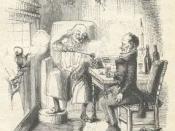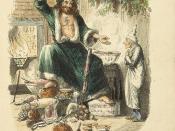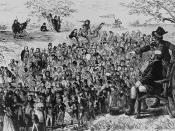Charles Dickens's underlying purpose is to inspire charity in his readers in the novel, "A Christmas Carol". Dickens shows a very caring spirit throughout the novel exposing a giving spirit to those less fortunate. Dickens's background was one of hardwork, slaving in a blacking factory, was both threatening and degrading for a young boy of 12. The novel contains a celebration of human kindness, relationship between social injustice and poverty and the demonstration of one man's redemption from greed in which Ebenezer Scrooge saves not only himself, but other.
Dickens portrays human kindness in the novel, by showing the antifisis of kindness and later concludes and shows an abundance of it. Scrooge is visited by the three spirits: the Ghost of Christmas Past, the Ghost of Christmas Present, and the Ghost of Christmas Future. Each of these ghosts appeal to a different part of his psyche and personality, attempting to draw from him the exploit of human kindness he so lacks.
Scrooge's relation with kindness represents the rich neglecting the poor. The Cratchits are a jovial family but lack in money due to Scrooge's mean character. "You don't need money to be happy" shows us that the Cratchits remain joyful despite their despite their disability with Tiny Tim and their shortage of material possessions they are contented. Mr Fezziwig is yet another who represents kindness by organising a Christmas party. Scrooge's first experience of a Christmas party was at the Fezziwigs with his extravagant, unstoppable, merry - making time. LS
Social justice is highlighted in the novel through the setting symbolising warmth, generosity, and compassion at Christmas time. Dickens's personal advocacy is shown in the ghost of Jacob Marley stating that "Mankind was my business". Scrooge is a stingy man, whose penny-pinching ways hut not only himself, but those...


